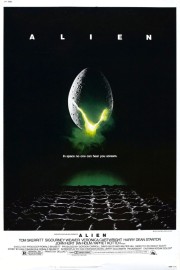Alien
Although it came two years after the landmark that was “Star Wars,” Ridley Scott’s “Alien” has more in common with “2001: A Space Odyssey.” In the world Scott created with writers Dan O’Bannon and Ronald Shusett, space travel is commonplace, and done not so much for exploration, but for business concerns. The crew of the Nostromo isn’t a rag-tag band of heroes flying through the galaxy, getting into adventures, but rather the workers on a mining ship on their way home. They’re awakened from their hibernating slumber by “Mother,” the artificial intelligence that runs the ship, when they intercept a signal from a nearby planet…a sign of life. (Or is it an SOS?) By law, they are obliged to investigate, and well, the rest is history.
Watching it for the first time in years (sans the RiffTrax, at least), the comparisons to “2001” were striking, especially in the mysterious, cerebral tone Scott takes in his direction, and bringing together realistic visual effects; intelligent character and story development; and sparse sound design, especially in the use of an evocative score by Jerry Goldsmith. In its subsequent entries, the “Alien” franchise became an action series revolving around this film’s lone survivor, Ellen Ripley (Sigourney Weaver), although in their own way, the films that followed this one maintained this movie’s level of intellectual fascination with moral issues presented by this singular movie monster. That Scott has decided to return to this world with his latest film (“Prometheus”) may feel like selling out, but even in his lesser films over the years, the director has always had something interesting to say, and I have no doubt that he’s done so with “Prometheus.”
“Alien” isn’t all visionary sci-fi, however; what it lacks in typical adventure, the film more than makes up for in horror thrills and intellectual intrigue. One of Scott’s great strengths in this movie is how he employs darkness and shadow plays not only in ratcheting up the tension, but also in developing the shape of the alien. The creature itself is one of the most distinctive images in movie history, but by suggesting its look slowly, as Spielberg did the shark in “Jaws,” Scott makes the final reveal all the more terrifying…and satisfying. Of course, his attention to detail in showing us the ship itself, with its unique outward design and combination of vast rooms and confined spaces, helps keep us guessing until the very end what this crew is dealing with.
But Scott and his writer have more on their minds than just scaring us; they also took their time to create a larger world unlike any other we had seen at that point. The remnants of the crashed ship they investigate, as well as the terrain of the planetoid they find the alien on, is a new creation, rather than just an extension of Earth like other sci-fi films. And when we learn the real story on the ship’s science officer, Ash (Ian Holm), we meet a new type of robot– part biological, part mechanical –that we will see again and again in this franchise, as Ripley becomes hopelessly, intriguingly, connected to the fate of the alien, as the company the Nostromo’s crew works for has its own plans for the alien, which Ripley, needless to say, disagrees with emphatically. As we see her fellow crew members (including Tom Skerritt, John Hurt, Harry Dean Stanton, Yaphet Kotto, and Veronica Cartwright) picked off one-by-one, we understand the hatred that will resonate in even the most flawed entries in the franchise (namely, David Fincher’s “Alien3”).
“Alien” was not Ridley Scott’s first film as a director (that was 1977’s “The Duelist”), but in a way, it did set the tone for his career in Hollywood. His next film was another influential science fiction epic (“Blade Runner”), and the past 30 years have seen him continue to push the boundaries of smart storytelling, sometimes combined with innovative visual effects, in films ranging from “Gladiator,” “Black Hawk Down,” and “Legend” to “Thelma & Louise,” “G.I. Jane,” and “Matchstick Men.” True, some of his films are best forgotten (like “A Good Year,” “White Squall,” “Body of Lies,” and “Robin Hood”), but he’s never been complacent to tell the same story over and over, which alone makes him one of the great, bold filmmakers of our time. Hopefully, he’s got a few more great films to share with us.










